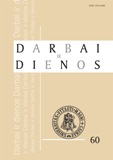Who Is Telling It to Whom? Economical, Political and Cultural Conditions for National Narrative in After-Post-Communist Lithuania
Who Is Telling It to Whom? Economical, Political and Cultural Conditions for National Narrative in After-Post-Communist Lithuania
Author(s): Andrius ŠvarplysSubject(s): Cultural Essay, Political Essay, Societal Essay
Published by: Vytauto Didžiojo Universitetas
Keywords: Post-communist Lithuania; Post-communism; Postmodern society; Post-communist national identity; After-post-communism; National narrative; Pokomunistinė Lietuva; Pokomunizmas; Postmoderni visuomenė; Pokomunistinė nacionalinė tapatybė
Summary/Abstract: It seems the need to explore the transformation of post-communist Lithuania is expired since the achieved membership in the EU and NATO is considered to be the firm evidence of successful post-communist transition. At the same time, Lithuania has seemingly entrenched its geopolitical orientation that has been based on the national narrative of “belonging to Europe”. Nevertheless, some socio-economical, political and cultural tendencies that have emerged in the last decade newly let to raise the question of national narrative. The elites’ consolidation in apparently consolidated democracy that produce the socio-economical discrepancies, a low political confidence of citizens and huge rate of emigration a normal condition in after-post-communist period? Or whether some features of postmodern society like consumerism, political skepticism, or simulation of social contract do not contribute to the natural fragmentation of the national narrative? Anyway, this is not without consequences for the success or failure of the national narrative, because since Sąjūdis times, both the “narrator” (the state, elites) and the “listener” (society, citizens) have changed significantly. Poreikis tyrinėti pokomunistinę Lietuvos transformaciją tarsi pasibaigęs, nes įstojus į ES ir NATO laikoma, kad šalis sėkmingai užbaigė ekonominį, politinį ir socialinį perėjimą iš sovietinės tvarkos į demokratijos santvarką. Lietuva, regis, galutinai įtvirtino savo geopolitinę orientaciją, kuri buvo sėkmingai grindžiama „priklausymo Europai“ nacionalinio naratyvo. Tačiau paskutiniame dešimtmetyje išryškėjusios kai kurios socioekonominės, politinės ir kultūrinės visuomenės charakteristikos iš naujo kelia nacionalinio naratyvo adekvatumo klausimą. Ar konsoliduotoje demokratijoje įsitvirtinusi elitų konsolidacija, produkuojanti plačios visuomenės socioekonominį atitolimą, itin žemą piliečių pasitikėjimą, didžiulę emigraciją, ir yra normali visuomenės būsena įveikus pokomunistines turbulencijas? Ar tam tikri postmodernios visuomenės bruožai, kaip vartotojiškas gyvenimo projektas, politinis skepticizmas ar socialinio kontrakto simuliacija, neprisideda prie natūralios nacionalinio naratyvo fragmentacijos? Kad ir kaip būtų, tai negali neturėti pasekmių nacionalinio naratyvo sėkmei ar nesėkmei, nes nuo Sąjūdžio laikų pastebimai pasikeitė tiek „pasakotojas“ (valstybė, elitai), tiek „klausytojas“ (visuomenė, piliečiai).
Journal: Darbai ir dienos
- Issue Year: 2013
- Issue No: 60
- Page Range: 265-280
- Page Count: 16
- Language: English

